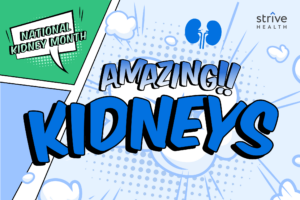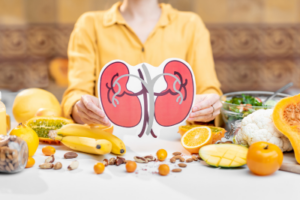Your Kidneys Are Small — and Truly Mighty!
Author : Strive HealthRead time: ~4 minutes

The kidneys have other jobs too. They help keep your blood pressure steady and make hormones. The hormones create red blood cells to keep your body strong.
- Your kidneys are good at cleaning your blood — so much so that, every day, they filter out 200 quarts of fluid, which is enough to fill a bathtub! After the fluid is filtered, it becomes urine and leaves the body.
- Your kidneys have little workers called nephrons that throw out all the waste your body doesn’t want and dispose it through your urine. They are the tiniest functional units in your body. Each one of our kidneys has about one million nephrons that work 24/7.
- You can live with one kidney! Your kidneys are adaptable. They can adjust enough to filter blood and keep your body functioning normally. In fact, a person may be born with only one kidney and still be okay. In addition, a person may have had a kidney taken out during an operation to treat disease or an injury. Another possibility is that they could have donated one to someone who needed a kidney transplant.
- Kidney stones are mineral deposits that can form in the urinary track. They can affect about 1 in 11 people in their lifetime. When a kidney stone passes through the urinary system it can cause a sharp, cramping pain called renal colic. It’s usually felt on the back side of the abdomen and comes in waves. Eventually, the stone will pass on its own through urine. Smaller kidney stones can take days or weeks. Larger kidney stones may require some medical help. There is a device called an Extracorporeal Shock Wave Lithotripsy that uses sound waves to break down the stone or it can be taken out with surgery.
- Have you ever had dark yellow pee with a strong odor? It could be caused by dehydration. When you don’t drink enough fluids, your kidneys make your urine concentrate more. Sometimes you’ll see this in the morning when you wake up. Staying hydrated is key to kidney health.
- The right kidney is usually smaller and lower than the left kidney. This is because of the position of other organs in your body that have less space in the abdomen.
- More than one in seven adults, or an estimated 37 million Americans, have kidney disease. There are a few factors that can cause kidney disease:
– Diabetes and or high blood pressure (hypertension) are the most common causes of kidney disease
– Being 60 years or older
– Having a family member with kidney disease
– Obesity
– Being African American/Black, Hispanic, Pacific Islander, American Indian or Alaskan Native
About 90% of Americans do not know they have kidney disease until it has progressed, or the kidneys become badly damaged. Kidney disease symptoms are not often noticeable because the symptoms are not always felt or are obvious. This is why it is important to get regular check-ups and screening tests because early detection can prevent kidney disease from getting much worse.
Symptoms of kidney disease include:
- Swelling of the face, hands, abdomen, ankles and feet
- Bloody or foamy urine
- Pain or difficulty with urination
- Puffy eyes
- Feeling tired
- Feeling more thirsty
There are 2 types of tests that can tell you how well your kidneys are functioning:
- Protein in urine test
- Blood creatinine test
If kidney disease is not managed, it can progress to end-stage kidney disease, which requires a transplant or dialysis.
Are you at risk for kidney disease or feeling symptoms? Please call your provider and ask to be tested. If you are a Strive patient with questions, call us to learn more at: 844-507-0733.





